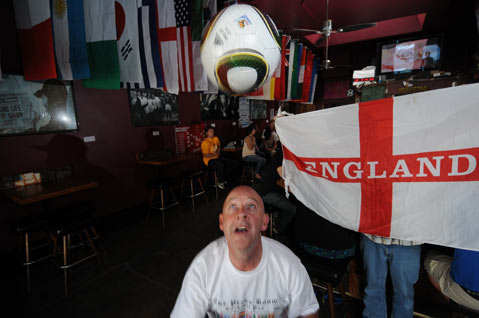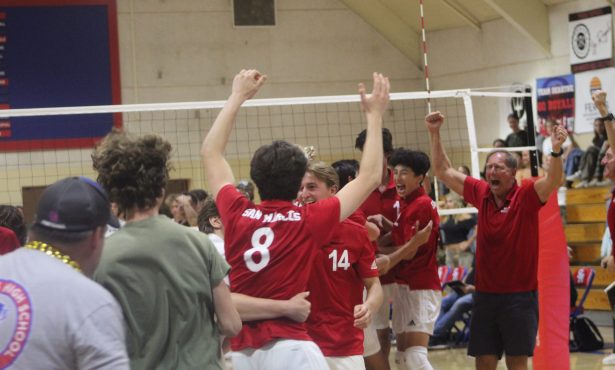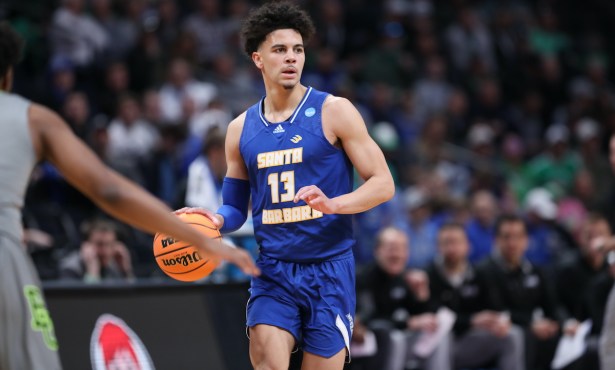Supreme Soccer
The World Cup Kicks Off in South Africa

Soccer, they say, brings out our tribal loyalties. It awakens pride. This month, when South Africa hosts the World Cup, it will also unify nations.
During a semester abroad this spring, I felt that pride at Parque de los Principes in Sevilla, Spain. It is not Lovik Field, the lush practice space at Westmont College, where I have played soccer under the pines and eucalyptus trees for the last three seasons. Parque de los Principes has a blacktop court, faded lines, crumbling bleachers, and an occasional stray dog sleeping beside the time-worn goalposts. But its passionate “football” players—ranging from ages 18 to 50—rarely miss a day to lace up their shoes. Mostly from lower-class backgrounds, they come here to escape the reality of Spain’s rising unemployment. This court becomes their sanctum. Here they can smoke, fraternize, and dream. They imagine themselves the next Lionel Messi, incapable of making an errant pass or shot. And they wear their daily uniforms proudly: dress socks and swim trunks, always paired with a jersey from the local club.
Those area clubs—Sevilla FC and Real Betis—are the source of regional pride, a Spanish hallmark. Sevillians call their city the “Girlfriend of the World,” the epitome of beauty, history, and class. Every region in Spain claims its own superiority, the preeminence of its soccer club, its food, slang, and festivals. This is partly due to Spain’s history of internal division during the nationalistic reign of Francisco Franco from 1939-’75 when the Basque Country, Catalonia, and Galicia initiated autonomy movements.
Yet there is one thing that unites them beyond the food, politics, or language—the Spanish national team. “Usually fans are all for their home city,” my friend, David de la Paz told me. “But when they see ‘La Roja,’ the fierce red of the national team, regional affiliations and rivalries are temporarily forgotten as the crowd screams ‘España Campeon! España Campeon!’”
The anticipation for the 2010 World Cup is especially high in Spain. Since its momentous European Cup victory in 2008, the national team has set records for winning streaks and fewest goals against in international play. Such success breeds an air of bravado. My Spanish host mother told me, “The Spanish media and citizens assume that the national team will win the tournament. That means that if they lose, the disappointment is that much greater. It is a gift and a curse to have this Spanish sense of pride.”
A Nation’s Pride
Far from the blistering sun of southern Spain, the chant of “Deutschland! Deutschland!” resonates throughout the frigid ice hockey arena. It is the first period of the IIHF Hockey World Tournament in Cologne, Germany, and the host nation is in a high-tempo, gritty match against Switzerland. I am watching the game in the cellar of my girlfriend Amy’s family, the Zillmers, who live in Kaarst, a quaint suburb of Dusseldorf. However, the cellar is not your dark and dank storage room, but rather a sports mega-theater, outfitted with the latest HD projector screen. It was created not for hockey but for soccer and the approaching World Cup.
Mementos from the last World Cup are everywhere. Fondly remembered as Sommer Märchen, or “Summer Fairy Tale,” the area people recall the 2006 tournament, hosted by Germany, not only as a success on the pitch—the German team reached the semifinals—but also as a rediscovery of national pride. Matthias Schaefer, a cousin who has studied at SBCC, said, “Before the World Cup, a few fans brought flags to the games or hung one outside their homes. During and after summer 2006, I truly felt proud to be a German.” In a powerful sense, German soccer has become a way to heal wounds and move beyond a troubling past.
Surrounded by such pride, I decide to get their take on the chances for my own nation. After all, the U.S. did upset Spain in last year’s Confederations Cup. While watching the German flags fill the hockey arena, I wondered if I might see the Stars and Stripes spreading across a South African stadium. So I ask the Zillmers about our chances. “The Americans?” the uncle, Rainer, responds. “Did the U.S. team even qualify?”
This month, when I see La Roja open the World Cup against Switzerland, I will think of my new friends at Parque de los Principes. When I see Germany line up against Australia, I will imagine the excitement in the Zillmers’ basement. When I see the South Africans waving flags in their homeland, I will wonder if this Cup can bring healing to a nation with its former shame and sorrows, as it did in 2006 for many Germans. And, to be honest, I hope I will also see Clint Dempsey or Landon Donovan do something marvelous with the ball that makes the world understand just why my nation deserves to be there, too.
Daniel Sargent is captain of the Westmont College soccer team and winner of a Golden Eagle scholar-athlete award. He will be entering his senior year in the fall.
The World Cup in S.B.
Tournament Schedule and Where to Watch: Nothing brings out the fullness of Santa Barbara’s cosmopolitan flavors like the FIFA World Cup, the quadrennial celebration of the most popular team sport. There will be a month of morning madness from June 11 to July 11 when 64 games are broadcast around the globe from South Africa.
Here is a glance at the first week:
• Friday, June 11: Mexico faces the host team, South Africa, in the 7 a.m. (California time) opener. Arturo Cordova will be watching from a chair in his barbershop at 3457 State Street. He has high hopes for Mexico, which dominated Italy, the defending world champion, in a friendly match last week. “They have good young guys,” Cordova said. “They have to focus, and they have to be lucky.” At 11:30 a.m., there will be booing and hissing at Dargan’s and the James Joyce. The Irish will be pulling for Uruguay against France and Thierry Henry, whose evil hand robbed Ireland in the qualifying round.
• Saturday, June 12: Argentina, with arguably the world’s greatest player (Lionel Messi) and the wackiest coach (Diego Maradona) takes on Nigeria at 7 a.m. You’ll have to show up for that game at the Press Room, the town’s premier soccer pub at 15 East Ortega Street, if you want to be there for the United States-England match at 11:30. James Rafferty, the bar’s proprietor, was a boy in Manchester when England won its only World Cup trophy in 1966. “The streets were empty,” he said. “Every time we scored, people ran outside, then ran back in.” He thinks England’s experience and the dynamic play of Wayne Rooney will be too much for the United States. UCSB soccer coach Tim Vom Steeg said the Americans have shown they can play with anybody, but he’s concerned about injuries to key players. “It’s too bad England is first,” Vom Steeg said. “The World Cup is about momentum. We beat Portugal in ’02 and that was a great start [the U.S. reached the quarterfinals], and in ’06 we never recovered from a bad loss to the Czechs.” Vom Steeg does think “all the pressure will be on England.” The remaining U.S. games in group play will be June 18 (7 a.m.) against Slovenia and June 23 (7 a.m.) against Algeria. The top two teams in the group will advance.
• Sunday, June 13: Germany, always a force to be reckoned with, opens against Australia at 11:30 a.m.
• Monday, June 14: The Press Room will be open for every match, so you can watch an exciting Netherlands team versus Denmark there at 4:30 a.m. Italy takes the stage at 11:30 a.m. against Paraguay. Rabid Italian fan Michele Ruggeri, manager of the Via Maestra 42 trattoria, has mixed emotions. “If we don’t start off on the wrong foot,” he said, “we don’t win at the end.” The ending in 2006, a shootout victory over France, was “double joy,” he said. “We are not friendly with the French.”
• Tuesday, June 15: Former UCSB defender Tony Lochhead plays for New Zealand against Slovakia at 4:30 a.m. Five-time champion Brazil tries out its new approach—smashmouth soccer—against North Korea at 11:30 a.m. Drum-thumping Brazilian supporters have adopted Sharkeez (416 State St.) as their World Cup home. A newer pub that will be catering to soccer fans is Union Ale Brewing at 214 State.
• Wednesday, June 16: Spain, the reigning European champ, is hungry for its first World Cup. The quest starts at 7 a.m. when La Roja throws its high-powered attack against Switzerland.
• Thursday, June 17: The pressure mounts as group play goes into the second round. Mexico faces France at 11:30 a.m.



